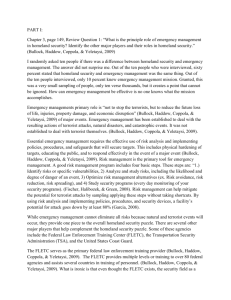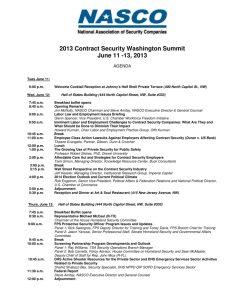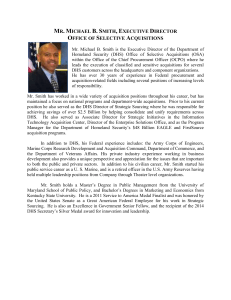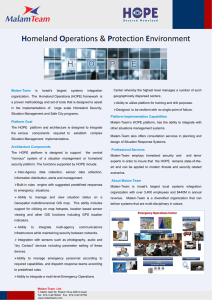Managing Homeland Security: PUAD 637 Department of Public and
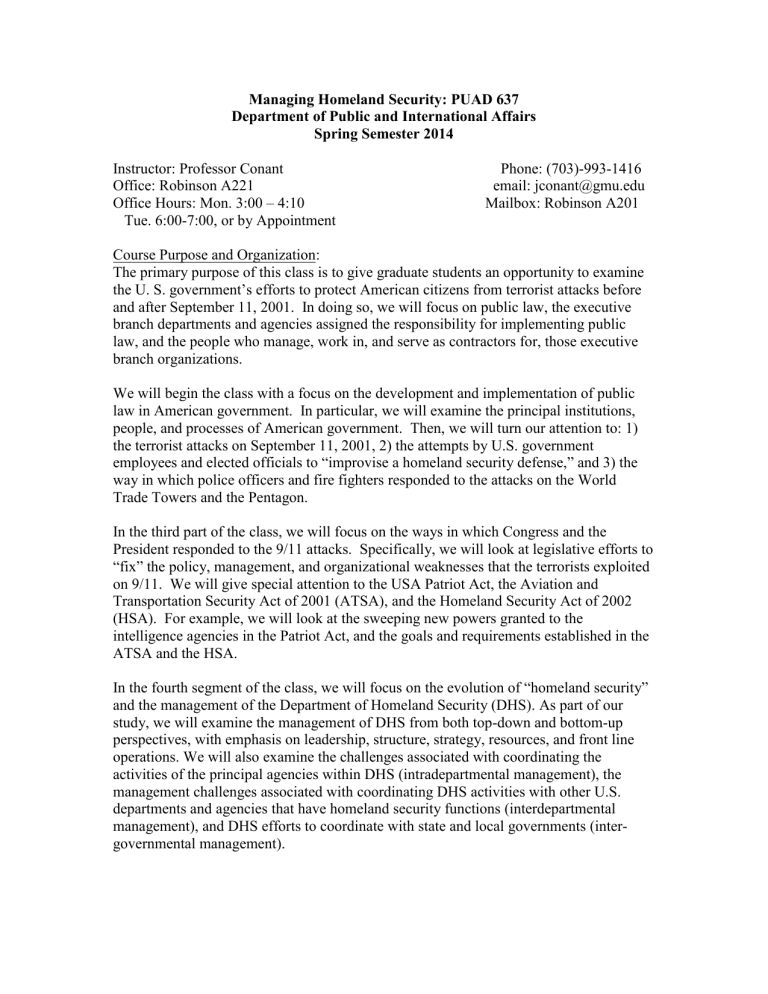
Managing Homeland Security: PUAD 637
Department of Public and International Affairs
Spring Semester 2014
Instructor: Professor Conant
Office: Robinson A221
Phone: (703)-993-1416
email: jconant@gmu.edu
Office Hours: Mon. 3:00 – 4:10 Mailbox: Robinson A201
Tue. 6:00-7:00, or by Appointment
Course Purpose and Organization:
The primary purpose of this class is to give graduate students an opportunity to examine the U. S. government’s efforts to protect American citizens from terrorist attacks before and after September 11, 2001. In doing so, we will focus on public law, the executive branch departments and agencies assigned the responsibility for implementing public law, and the people who manage, work in, and serve as contractors for, those executive branch organizations.
We will begin the class with a focus on the development and implementation of public law in American government. In particular, we will examine the principal institutions, people, and processes of American government. Then, we will turn our attention to: 1) the terrorist attacks on September 11, 2001, 2) the attempts by U.S. government employees and elected officials to “improvise a homeland security defense,” and 3) the way in which police officers and fire fighters responded to the attacks on the World
Trade Towers and the Pentagon.
In the third part of the class, we will focus on the ways in which Congress and the
President responded to the 9/11 attacks. Specifically, we will look at legislative efforts to
“fix” the policy, management, and organizational weaknesses that the terrorists exploited on 9/11. We will give special attention to the USA Patriot Act, the Aviation and
Transportation Security Act of 2001 (ATSA), and the Homeland Security Act of 2002
(HSA). For example, we will look at the sweeping new powers granted to the intelligence agencies in the Patriot Act, and the goals and requirements established in the
ATSA and the HSA.
In the fourth segment of the class, we will focus on the evolution of “homeland security” and the management of the Department of Homeland Security (DHS). As part of our study, we will examine the management of DHS from both top-down and bottom-up perspectives, with emphasis on leadership, structure, strategy, resources, and front line operations. We will also examine the challenges associated with coordinating the activities of the principal agencies within DHS (intradepartmental management), the management challenges associated with coordinating DHS activities with other U.S. departments and agencies that have homeland security functions (interdepartmental management), and DHS efforts to coordinate with state and local governments (intergovernmental management).
Course Pedagogy
This class will be conducted in a seminar style. Most class sessions will be conducted in a discussion mode, and course readings will serve as the basis for discussion. Your responsibilities for each class include completing required readings and being prepared to discuss those readings. I will present mini-lectures during most class sessions. I may also invite other faculty members or DHS managers to give guest presentations on topics we are studying. Additionally, I may arrange a class visit to one or more of the principal agencies we are studying within DHS in order to facilitate presentations to the class by senior managers in those organizations.
Course Learning Objectives:
At the end of this course, you will be able to be able to identify some of the principal institutional, policy, organizational, and management failures that allowed the Al Qaeda terrorists to carry out their deadly plans on 9/11. You will also be able to identify some of the most important institutional, policy, organizational, and management changes that were made in response to the 9/11 terrorists’ attacks. Finally, you will be able to identify some of the key challenges associated with managing the DHS secretariat, managing the principal agencies within DHS, coordinating homeland security activities within DHS, coordinating DHS activities with the activities of other U.S. government executive branch organizations that have homeland security responsibilities, and coordinating DHS activities with state and local governments.
Course Work and Grades:
For most of you, the work for this course will include: 1) a three page memo on the
Aviation and Transportation Security Act, 2) a five page paper, which consists of the first four sections of the final paper, and 3) the final paper. The format and content requirements for these writing assignments will be provided in class. Alternatively, you can write a final exam in place of the paper(s). The questions for that exam will be distributed on the last day of class. Exam answers are due on May 13 at 7:20 PM. All written work will be submitted electronically.
Standard Work/Grade Structure
Memo 1 Final Paper Part I
Due Class #6 Due Class #8
Final Paper
Due May 6
Class Disc.
Each Class
Total
15% 15% 50% 20% 100%
Alternative Work/Grade Structure
Memo 1
Due Class #6
15%
Final Exam
Due May 13
65%
Class Disc.
Each Class
20%
Total
100%
Grade Scale :100-92 = A; 91-90=A-; 89-88= B+; 87-82=B; 81-80=B-; < 80=C; < 70=F
2
Late Papers: All written assignments must be submitted at the beginning of the class period on which they are due. A one-grade penalty will be applied to a paper that is one to three days late; a two-grade penalty will be applied for three to seven days.
Incompletes for the course are discouraged, but extraordinary circumstances can be accommodated. Requests for an incomplete must be submitted in writing at the earliest possible date.
Other Key Information
Honor Code : George Mason University has an Honor Code, which requires all members of this community to maintain the highest standards of academic honesty and integrity.
Cheating, plagiarism, lying, and stealing are all prohibited. All violations of the Honor
Code will be reported to the Honor Committee. See honorcode.gmu for more detailed information. The core presumption of the code is that all written work is your own work.
Proper citation of material taken from other published work is required.
Disability: If you are a student with a disability and you need academic accommodations, please see me and contact the Office of Disability Resources at 703-993-2474. All academic accommodations must be arranged through that office.
Enrollment Status : All students are responsible for verifying their enrollment in this class. Schedule adjustments should be made by the deadlines published in the Schedule of Classes . The last day to add a course is January 28, 2014. The last day to drop a course is February 21, 2014. After the last day to drop a class, withdrawing from this class requires the approval of the dean and is only allowed for nonacademic reasons.
Required Readings Available for Purchase at the GMU Bookstore:
1. Reader I (only available at the GMU Bookstore-Fairfax Campus)
2. Reader II (only available at the GMU Bookstore-Fairfax Campus)
3. James Q. Wilson, Bureaucracy (2000)
4.
The National Commission on Terrorists Attacks Upon the United States: The 9/11
Commission Report (2004)
5. David Halberstam, Firehouse (2002)
6. Donald Kettl, System Under Stress: Homeland Security and American Politics , 3rd ed.
(2006)
7. Bullock, Haddow, and Coppola, Introduction to Homeland Security, 4 th ed.
8. Stephen Flynn, America the Vulnerable (2004)
Required Readings That are Not Available for Purchase at the GMU Bookstore:
Strasser, ed., The 9/11 Investigations (2003)
Other Recommended Readings that may be available at the GMU Bookstore:
Staff Report of the National Commission on Terrorist Attacks Upon the United
States, Terrorist Travel
3
The course calendar and topic list provided below constitutes a plan for this course.
Inclement weather, changes in the availability of guest presenters, or other factors may necessitate amendments to this plan.
I . INTRODUCTION AND OVERVIEW
1. Policy-making and Management in the U.S. Governmental System
(Jan. 21)
Reader I, Table of Contents items 1. – 6.
James Q. Wilson, Bureaucracy , pages 31-32 and Chapter 13 “Congress”
Donald Kettl, System Under Stress , 3 rd . ed., Chapter 1.
Recommended:
Robert Katz, “Skills of an Effective Administrator,” HBR , 1974
Charles Lindblom, “The Science of Muddling Through,” Public Administration
Review , 1959
2. Policy-making and Management in the U.S. Governmental System
(Jan. 28)
Reader I, Table of Contents items 7. – 16.
Luther Gulick, “Notes on a Theory of Organization,” Reader I
James Q. Wilson, Bureaucracy , Chapter 14 “Presidents,”
James Q. Wilson, Bureaucracy , Chapter 15 “Courts”
II. THE TERRORIST ATTACKS ON SEPTEMBER 11, 2001
3. The Aviation Security System on 9/11, Terrorist Hijacking of Four Commercial
Airliners, and Efforts to Improvise a Homeland Security Defense
(Feb. 4)
The 9/11 Commission Report , Chapter 1 “We Have Some Planes”
The 9/11 Investigations , “Staff Statement No. 3 “The Aviation Security System and the 9/11 Attacks”
The 9/11 Investigations , “Staff Statement No. 4 “The Four Flights”
James Q. Wilson, Chapters 7-9
Recommended:
Benson, Bruce, "Preparing for the Improbable and Unpredictable: The Arlington County
Police Department's Response to the 9/11 Terrorist Attack on the Pentagon"
(2004)
Fredrik Logevall ed., Terrorism and 9/11 (2002)
4
4. The World Trade Towers and the Pentagon: On the Front Lines with the
Emergency Responders
(Feb. 11)
David Halberstam, Firehouse
The 9/11 Commission Report , Chapter 9
James Q. Wilson, Chapters 3-6
5. The 1993 Attack on the World Trade Towers, Bin Laden, The Evolution of the
Al-Qaeda Terrorist Threat and U.S. Government Responses Before 9/11
(Feb. 18)
The 9/11 Investigations , pp. 538 – 544, “Selected Events in the Chronology of
Terrorism, 1983 - 2004”
The 9/11 Commission Report, Chapters 2 – 8
The 9/11 Investigations, “The Presidential Daily Brief, August 6, 2001” pp. 292-293
The 9/11 Investigations Appendix D, “The Presidential Daily Brief, August 6, 2001”
Recommended Reading:
Robin Wright, Sacred Rage: The Wrath of Militant Islam
III. PRESIDENTIAL and CONGRESSIONAL RESPONSES TO THE 9/11
ATTACKS: 2001 and 2002
6. The Military Campaign in Afganistan, The USA Patriot Act, The Aviation and
Transportation Security Act, and the Process of Building the TSA
(Feb. 25)
Donald Kettl, System Under Stress , 3 rd ed., Chapter 6
The Aviation and Transportation Security Act of 2001 (Reader I)
Recommended:
USA Patriot Act
The 9/11 Commission Report, “Strategies for Aviation and Transportation Security,” pp. 390-393
7. Homeland Security Strategy, The Homeland Security Act of 2002, “Building”
Department of Homeland Security by Reorganizing the Executive Branch, the
Creation of the 9/11 Commission and the 9/11 Commission Report
(March 4)
Donald Kettl, System Under Stress , 3 rd . ed., pp. pp. 40-45 and Chapter 3
The Homeland Security Act of 2002
The 9/11 Investigations , “Introduction by Craig Whitney”
The 9/11 Investigations, “Staff Statement No. 1” and “Staff Statement No. 2”
The 9/11 Commission Report , Chapters 10-13
5
Bullock, Haddow, and Coppola, Introduction to Homeland Security, 4 th ed ., Chapter 1
Recommended:
The 9/11 Commission Report, Chapters 11-12
Homeland Security Strategy, 2002
PBS FRONTLINE Video, “The Man Who Knew” (Special Agent John O’Neill)
PBS FRONTLINE Video, “Inside 9/11”
Samuel P. Huntington, The Clash of Civilizations and the Remaking of World Order
(1996, 2003)
SPRING BREAK: March 10-15
IV. EVOLUTION AND MANAGEMENT OF HOMELAND SECURITY: 2003-
2013
8. Secretary Chertoff Reorganizes DHS; The Focus on Terrorism Leads to a
Disaster and Another Reorganization of DHS; Current Structure of DHS, Other
Departments and Agencies with Homeland Security Functions
(March 18)
Bullock, Haddow, and Coppola, Introduction to Homeland Security, 4 th
Kettl, Chapt. 4
ed ., pp. 51-53
Bullock, Haddow, and Coppola, Chapter 4
Recommended:
Post-Katrina Emergency Management Reform Act of 2006
9. Managing DHS: The Secretary, Secretariat, Political Appointees, Congressional
Oversight, and Intergovernmental Relations
(March 25)
Kettl, Chapt 5
James Q. Wilson, Chapters 10-12
Cherthoff’s Letter (Reader II)
Balunis and Hemphill, “Escaping the Entanglement: Reversing Jurisdictional
Fragmentation over the Department of Homeland Security” (Reader II)
Recommended:
Bullock, Haddow, and Coppola, Chapt. 12
6
10. Managing Transportation Security: Airports and Commercial Aviation, Rail, and Buses
(April 1)
Bullock, Haddow, and Coppola, Chapter 7
Conant, “Appropriating for Transportation Security” (Reader II)
Josh Fudge, “Rail Security” (Reader II)
11. Managing Border Security, Immigration, and Customs Enforcement: Airports
(April 8)
Bullock, Haddow, and Coppola, Chapter 6
Bettancourt, Laura, Chris Daly, and Paige Hess, "Dulles Case Study" (Reader II)
12. Managing Immigration, Trade, and Border Security: Sea Ports, Land Ports, and
Borders
(April 15)
Montaigne, Fen, “Policing America’s Ports, Smithsonian , Jan. 2004 (Reader II)
Stephen Flynn, America the Vulnerable
13. Managing Intelligence and Counterterrorism: Linking DHS to the DOD and the
Intelligence Agencies
(April 21)
Bullock, Haddow, and Coppola, Chapter 5
14. Managing Cybersecurity, Managing Infrastructure Protection, and the Future of Homeland Security
(April 29)
Bullock, Haddow, and Coppola, Chapter 8
Bullock, Haddow, and Coppola, Chapt. 13
Kettl, Chapter 7
Final Papers Due: May 6
Final Exam Due: May 13
7

